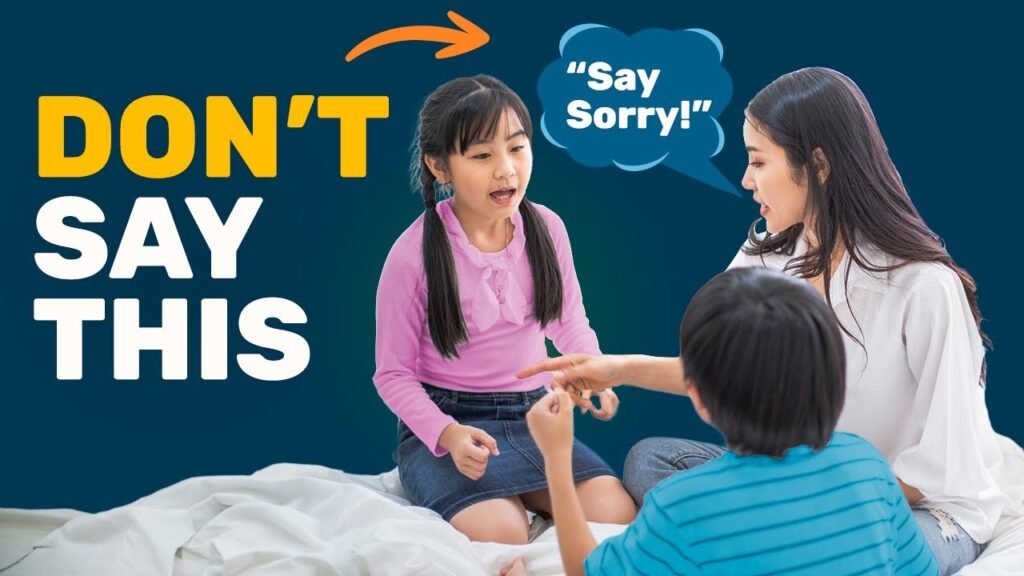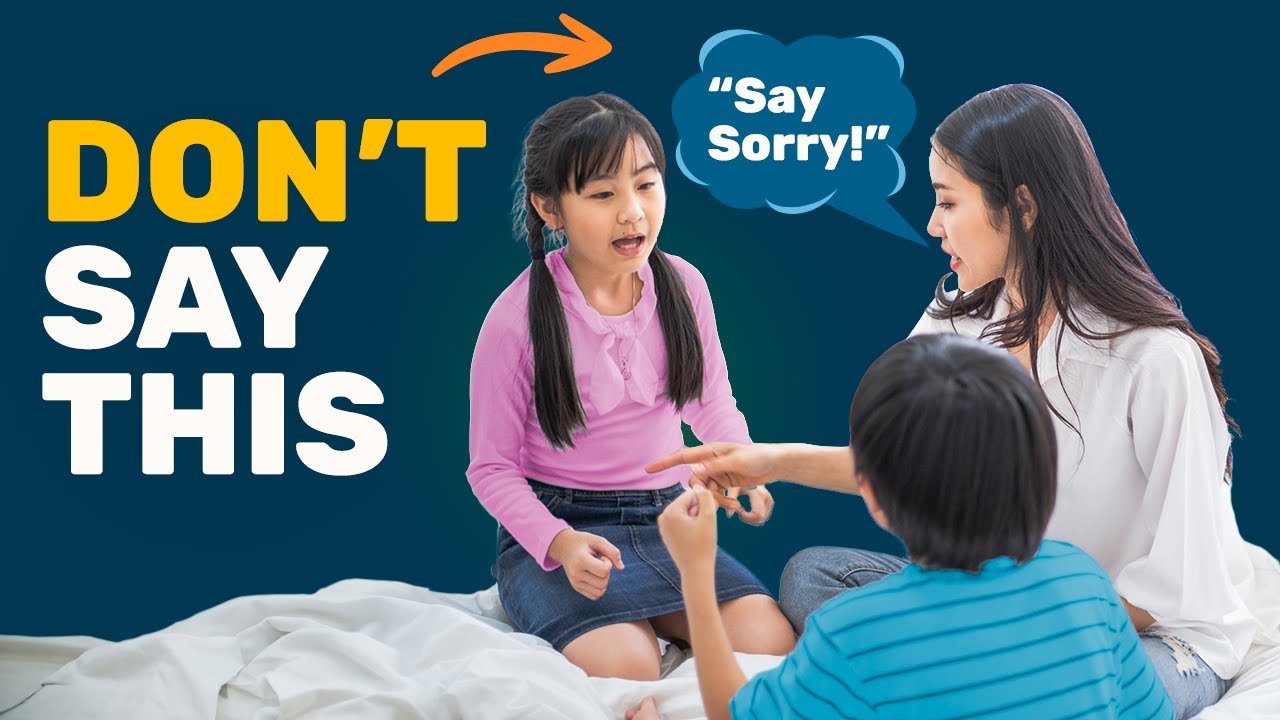If your child hurts or upsets another child, it’s natural to want them to say sorry. However, simply forcing them to say those two words may not be the most effective approach. In a video by Emma Hubbard, she discusses the reasons why this method may fall short and suggests a different approach that aligns with the developmental stage of toddlers. The goal is for children to genuinely understand and feel remorse for their actions, rather than just uttering a hollow apology. By guiding toddlers to recognize and care about how their actions affect others, parents can foster empathy and teach their children the importance of making amends. The video also emphasizes the need for using age-appropriate language and actively involving children in the process. While parenting a toddler can come with challenges, this video offers valuable tips for managing their behavior and promoting positive development.
Introduction
Parenting a toddler can be challenging, especially when it comes to teaching them how to respond to their actions. One common approach is to force a child to say sorry, but research suggests that this may not be the most effective method. This article will explore the ineffectiveness of forcing apologies and offer an alternative approach to teach toddlers about empathy and making amends. By using a step-by-step approach and actively involving the child in the process, parents can help their toddlers develop a genuine understanding of their actions and learn how to navigate conflicts with empathy and kindness.
The Ineffectiveness of Forcing Apologies
Toddlers’ Insincere Apologies
When a child hurts or upsets another child, it is natural for parents to expect them to say sorry. However, toddlers often give quick and insincere apologies without truly understanding the meaning behind them. This approach of forcing apologies does not teach them how their actions affect others or guide them on how to fix things. Instead, it gives the impression that a simple sorry is enough to make everything better.
Lack of Understanding and Remorse
Forcing apologies also fails to address the lack of understanding and remorse that toddlers may have. Toddlers are still developing their abilities to understand and consider the emotions of others. Their egocentric nature, where they assume everyone thinks and feels the same way they do, may hinder their ability to grasp empathy fully. At this stage of development, expecting a deep and meaningful apology may be unrealistic.
The Goal of Genuine Understanding
Rather than solely focusing on getting a forced apology from a toddler, the goal should be to help them genuinely understand and feel remorse for their actions. The focus should be on guiding them to recognize and care about how their actions affect others. This way, when a toddler does apologize, it comes from a place of genuine understanding and empathy. The aim is for them to recognize that their actions have consequences and learn how to make amends.

Toddlers’ Egocentrism and Empathy
Limited Grasp of Empathy
Toddlers’ limited grasp of empathy is a result of their egocentric nature. At this stage of development, children often believe that everyone sees, thinks, and feels exactly as they do. They may struggle to understand that others have different feelings and perspectives. Recognizing and empathizing with others’ emotions is a crucial skill that takes time to develop.
Developmental Milestones
Research shows that the recognition of others’ emotions and understanding different perspectives, known as theory of mind, starts to develop around the age of four or five. Before this age, expecting toddlers to demonstrate a deep understanding of empathy and offer meaningful apologies may be unreasonable. Understanding these developmental milestones can help parents adjust their expectations and approach to teaching empathy.
A Step-by-Step Approach
Recognizing the Impact of Actions
To help toddlers develop empathy and understand the impact of their actions, parents can start by drawing their attention to the emotions of the affected child. Instead of immediately jumping to forcing an apology, parents can point out how the other child may be feeling. By doing this, parents ensure that the child does not feel guilty or ashamed, making them more willing to try and fix the situation.
Using Age-Appropriate Language
When discussing the impact of their actions, it is important for parents to use age-appropriate language. Parents should adjust their words and explanations to match their child’s level of understanding. A communication milestone chart can be a helpful tool in determining the appropriate language to use for each age group.
Adjusting Explanations to Match Understanding
Along with using the right language, parents should adjust their explanations to match their child’s understanding. Explaining in simple terms why the other child is upset and connecting it directly to their own actions can help toddlers grasp the cause-and-effect relationship. This step ensures that toddlers can make the connection between their actions and the emotions of others.
Involving the Child in Making Amends
Teaching Kindness and Empathy
Making amends goes beyond simply saying sorry. Parents should actively teach their toddlers about kindness and empathy. By involving the child in the process of making amends, parents can guide them towards understanding the impact of their actions. This can range from giving a simple hug to offering an ice pack or returning a toy that was taken. These actions help toddlers experience firsthand how it feels to be kind to others.
Actively Engaging the Child
While involving the child in making amends is essential, it is important to note that toddlers may not always cooperate or fully understand. They may be overwhelmed by big emotions or exhibit stubbornness. In these moments, parents should remain consistent and patient. Consistency in guiding them towards empathy and modeling empathetic behavior is key. If the child is not responsive, parents can step in and model the behavior themselves, showing the child how to be kind, caring, and make amends.
Challenges and Consistency
Toddlers’ Lack of Cooperation
Toddlers are known for their occasional lack of cooperation, which can make navigating conflicts and teaching empathy challenging. It is important to remember that developing empathy and the ability to see things from someone else’s point of view takes time. Although it may be frustrating when a toddler refuses to check in on the other child, it is necessary to remain consistent and keep working on teaching empathy.
Importance of Consistency
Consistency is crucial when it comes to teaching empathy and making amends. Even if a toddler does not understand or exhibit empathy on the first, second, or even fourth try, parents should continue to guide them and model empathetic behavior. Consistency helps toddlers internalize these values and behaviors over time.
Modeling Empathetic Behavior
One of the most effective ways to teach empathy and make amends is through modeling empathetic behavior. Parents can show their toddlers what it looks like to apologize genuinely and take responsibility for their actions. By modeling kindness, caring, and making amends, parents provide a strong foundation for their child’s development.
Conclusion
Forcing toddlers to say sorry may not effectively teach them empathy and the impact of their actions. Instead, parents can take a step-by-step approach to guide their child towards genuine understanding and making amends. By recognizing the impact of actions, using age-appropriate language, involving the child in the process, and remaining consistent, parents can help their toddlers develop empathy and navigate conflicts with kindness. Modeling empathetic behavior is crucial in teaching children these important life skills. Though the challenges of parenting a toddler can be overwhelming, with patience and consistent guidance, parents can shape their child’s understanding of empathy and foster a caring and compassionate attitude.

